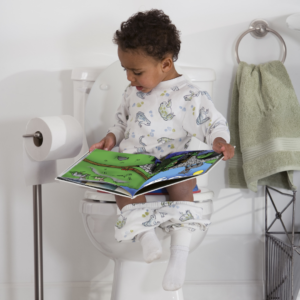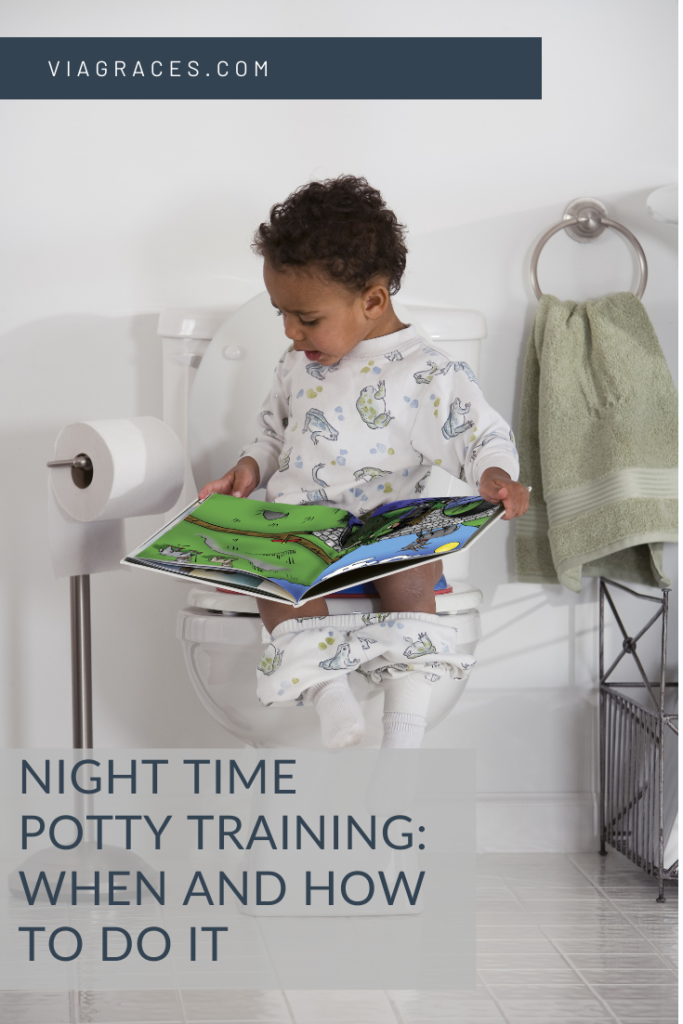Sleep and potty training…two huge topics frequently talked about in the parenting world! Because it looks a bit different for every family, and there are different approaches you can take to both.
Then combine sleep and potty training, and you get night time potty training…YIKES!
I’ve got you covered when it comes to sleep, but potty training is not my forte. That’s why I’ve reached out to the expert, Jess, of Rooted in Routine, to answer some big questions on the blog.
I’m taking just as many notes as you are!

How do you suggest parents approach night time potty training? How do we know if our kids are ready to stay dry?
The most important thing to know about night time potty training is that night time bladder and bowel control typically takes much longer to obtain than day time control.
This means that it is totally normal for your child to continue to wet/soil themselves overnight, even if they are completely potty trained during the day! Most children gain night time control somewhere between 3-5 years old.
The best thing you can do to work toward night time control is to observe your child in the morning. Most children will naturally start waking up dry some mornings.
Once your child wakes up dry a few mornings in a row, try removing the night time diaper and see what happens.
Product suggestions:
- Some parents like to use super-absorbent underwear or pajamas during this transition period as well. Peejamas is a great option!
- Brolly Sheets are another great option to place right on top of your child’s fitted sheet, so if they have an accident you simply remove it and the sheet underneath is still dry! It keeps the overnight accidents quick and easy to clean up.
- You can also get waterproof mattress pad covers. Place one right over the mattress, followed by a fitted sheet. Then place another waterproof cover on top, followed by another fitted sheet. So if your child does have an accident overnight, you can quickly strip off the wet sheet and mattress cover and there’s already another sheet and mattress cover ready to go underneath.
*Note: if your child is 5-6 years old and is still consistently waking up wet in the mornings, I recommend checking in with your pediatrician to rule out any medical causes of bedwetting.
What are your tips for helping kids stay dry all night so they don’t have to get up to use the bathroom?
This can vary greatly from child to child, but there are a few tips to help decrease the likelihood that your child will have to use the bathroom in the middle of the night.
First, limit drinking any liquids at least 1-2 hours before bedtime. Of course, if your child is thirsty, they can have something to drink, but keep it minimal when possible.
Second, make sure you include using the bathroom as part of their bedtime routine. You can even try including it twice (once at the beginning of the routine, and once again right before bed) to really ensure they empty themselves before they sleep.
Ultimately, know that this skill takes time and it is still normal to need to use the bathroom in the middle of the night – many adults do!
Let’s talk dream pees!
What is a dream pee?
A dream pee is a parent-initiated process where you wake your child and help them go to the bathroom at some point during the night. The goal here is to allow your child to empty their bladder so they do not wet themselves over night.
Dream pees are typically done between the hours of 10pm-12am (before the parent goes to sleep), but can technically be done at any time during the night.
How do you support your child for a dream pee?
If you want to try a dream pee, set up a “potty space” in your child’s room with a mini-potty, wipes/toilet paper, a towel, fresh underwear and/or pajamas, and a dim night light. This is simply to not disrupt the child’s sleep as much as possible.
Gently wake your child at the desired time and help them sit on the toilet. Keep the entire experience calm – do not turn on the full lights, speak in a soft voice, etc.
Your child may not actually pee, and that’s okay – you are simply giving them the opportunity to do so. Be consistent for a few days/weeks before determining if this works or doesn’t work for your child.
Do dream pees work?
I have seen them work well for some children and not for others.
To be honest, I don’t love the dream pee – I haven’t personally seen it be that successful and/or necessary with most of the families I work with. But I like to give it as an option if parents are interested!
The goal of the dream pee is to empty the child’s bladder so that they don’t wake up wet in the morning, and it’s particularly helpful if the child waking up wet is disruptive or uncomfortable to them in any way and therefore causing early morning wakings or disruptive sleep in any way.
If a child is wetting themselves overnight and it is not disruptive to them in any way, I typically recommend just waiting it out because children usually “grow out of it” as their bodies mature.
In my opinion, sleep is more important than night time potty training, so I try not to disrupt sleep whenever possible!
What are your tips for helping older kids be independent with night time toileting?
This depends on the child, but typically around 5-6 years old, children can learn to use the bathroom at night by themselves. It’s important first that they are independent during the day before we can expect them to become independent at night.
It can be helpful to post a visual chart in the bathroom with the steps of the bathroom process (pull down pants, sit on toilet, pee, wipe, etc.) so your child can “see” what they need to do.
I also recommend having a nightlight that your child knows how to turn on and off. It can also be helpful to teach your child to carry a comfort object, such as a stuffed animal, with them to and from the bathroom to help reduce any fear in the middle of the night.
This skill can take time, so be patient! Practice a ton during the day and role-play through what will happen at night if they wake up and need to go.
And remember, safety is always the number one priority, so make sure there is nothing potentially unsafe in the bathroom environment at night and use your best judgement in knowing if your child is ready for this or not.
Conclusion
Like everything in parenting, night time potty training will likely happen at a different age for your child than your friend’s, and that’s okay! It will likely look quite different among your own kids, too. Know that that is normal and it’s a process that takes time and patience. Give yourself and your child grace!
About the Author

Jessica Rapp is a childhood routine expert, pediatric occupational therapist, and lover of all things child development. She founded Rooted in Routine to help parents learn simple, easy to implement routines for optimal child development. Her approach is largely rooted in going back to the basics to help you establish solid, age-appropriate routines for your child for things like mealtimes, play, potty, and sleep. She believes this is the most important foundation you can provide for your child – and she wants to help you do just that!
Have a young toddler or preschooler (18 months – 3 years) and ready to start the process of potty training? Join Jessica’s next Potty Training Bootcamp!
